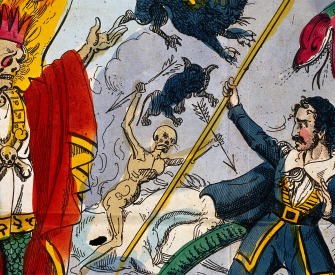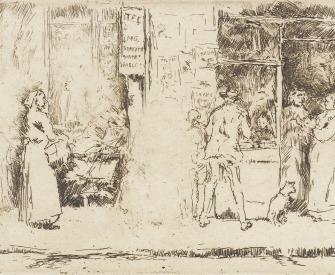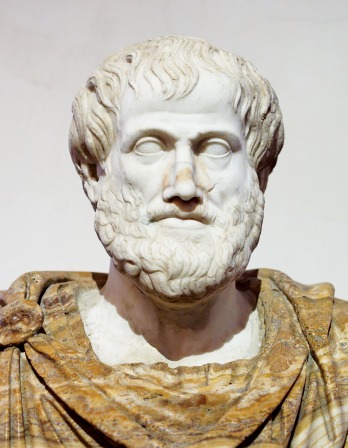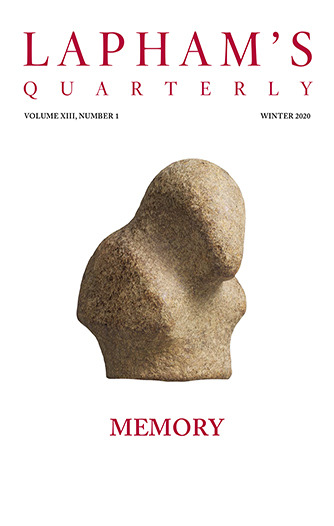All the streetcars had stopped, and it was two miles to the Winter Palace. A huge motor truck was just leaving Smolny. We hailed it and climbed on board. We found we had for companions several sailors and soldiers and a man from the Wild Division, wearing his picturesque long black cape. They warned us gaily that we’d probably all get killed, and they told me to take off a yellow hatband, as there might be sniping.
Their mission was to distribute leaflets all over town, and especially along the Nevsky Prospect. The leaflets were piled high over the floor of the truck, together with guns and ammunition. As we rattled along through the wide, dimly lit streets, they scattered the leaflets to eager crowds. People scrambled over the cobbles fighting for copies. We could only make out the headlines in the half-light:
Citizens! The provisional government is deposed. State power has passed into the organ of the Petrograd Soviet of Workers’ and Soldiers’ Deputies.
Before I left Smolny, I had secured a pass from the new, famous Military Revolutionary Committee. My pass read:
No. 1
Military Revolutionary Committee of the Petrograd Council of Workers’ and Soldiers’ Deputies gives Tovarishch Louise Bryant free passage through the city.
Signed by the chairman and secretary of the Military Revolutionary Committee and stamped by the Military Division.
Where the Ekaterina Canal crosses the Nevsky, guards informed the driver that we could go no farther. So we jumped down and found ourselves witnesses to as fantastic a political performance as ever took place in history.
Huddled together in the middle of the Nevsky were the delegates of the Socialist-Revolutionary and Menshevik parties. Unto themselves they had since gathered various wives and friends and those members of the city Duma who were not Bolsheviks, Left Socialist-Revolutionaries, or Menshevik Internationalists—so that their number was something over two hundred. It was then two o’clock in the morning.
For a time, I confess, we were all pretty much impressed by these would-be martyrs; any body of unarmed people protesting against armed force is bound to be impressive. In a little while, however, we couldn’t help wondering why they didn’t go ahead and die as long as they had made up their minds to it—and especially since the Winter Palace and the provisional government might be captured at any moment.
When we began to talk to the martyrs, we were surprised to find that they were very particular about the manner in which they were to die—and not only that, but they were trying to persuade the sailor guards that they had been given permission to pass by the Military Revolutionary Committee. If our respect for their bravery weakened, our interest in the uniqueness of their political tricks grew a good deal; it was clear that the last thing the delegates wanted to do was to die, although they kept shouting that they did at the top of their voices. “Let us pass! Let us sacrifice ourselves!” they cried like bad children.
Only twenty husky sailors barred the way. And to all arguments they continued stubborn and unmoved. “Go home and take poison,” they advised the clamoring statesmen, “but don’t expect to die here. We have orders not to allow it.”
“What will you do if we suddenly push forward?” asked one of the delegates.
“We may give you a good spanking,” answered the sailors, “but we will not kill one of you—not by a damn sight!”
This seemed to settle the business. Prokopovich, minister of supplies, walked to the head of the company and announced in a trembling voice, “Comrades, let us return, let us refuse to be killed by switchmen!” Just exactly what he meant by that was too much for my simple American brain, but the martyrs seemed to understand perfectly, for off they marched in the direction from which they had come and took up headquarters in the city Duma.
When we showed our passes, it was like magic, the sailors smiled and let us go forward without a word. At the Red Arch, soldiers informed us that the Winter Palace had just surrendered. We ran across the square after the Bolshevik troops, a few bullets whistled by, but it was impossible to tell from which direction they came. Every window was lit up as if for a fête, and we could see people moving about inside. Only a small entrance was open, and we poured through the narrow door.
The ministers of the provisional government were betrayed by the employees in the palace, and they were quickly hauled out of all sorts of secret back rooms and passages. They were sent to Peter and Paul Fortress. We sat on a long bench by the door and watched them going out.
The Women’s Regiment, amounting to about two hundred, were also disarmed and told to go home and put on female attire.
Everyone leaving the palace was searched, no matter on what side he was. There were priceless treasures all about, and it was a great temptation to pick up souvenirs. I have always been glad that I was present that night because so many stories have come out about the looting. It was so natural that there should have been looting and so commendable that there was none.
A young Bolshevik lieutenant stood by the only unlocked door, and in front of him was a great table. Two soldiers did the searching. The lieutenant delivered a sort of sermon while this was going on. I wrote down part of his speech: “Comrades, this is the people’s palace. This is our palace. Do not steal from the people. Do not disgrace the people.”
It was amusing to see what those great, simple soldiers had taken—the broken handle of a Chinese sword, a wax candle, a coat hanger, a blanket, a worn sofa cushion. They laid them out all together, their faces red with shame. And not one thing was of the least value!
About five o’clock the same morning we left the Winter Palace and called at the city Duma. Here we found the indignant and no longer self-sacrificing politicians furiously forming what they ingeniously chose to call the “Committee for Saving the Country and the Revolution.”
Soon after it fell into their hands, the Soviet government turned the Winter Palace into a People’s Museum.
From Six Red Months in Russia. Having begun in 1912 to write for radical publications, among them The Masses and Blast, Bryant left her dentist husband and her home in Portland, Oregon, on New Year’s Eve in 1915 for fellow journalist John Reed in New York City. She and Reed both reported on World War I from Europe, and then they traveled to Russia in 1917 in time to witness the October Revolution. She died at the age of fifty in 1936.
Back to Issue




